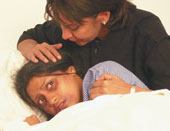 |
| Unreal zone: Shabana Azmi and Konkona Sen Sharma in a still from the film 15 Park Avenue |
Meethi believes she lives on 15 Park Avenue with her happy family of five children and a loving husband. Murali Sen is often found in conversation with his friend. And Dipali Saha leaves for work every day at 9 am. So what’s the connection between them, you may ask. Well, just like Meethi’s happy family, which, if you’ve seen the film 15 Park Avenue, or read the reviews, exists only in her imagination, Sen’s friend and Saha’s job are also figments of their disturbed minds. Like Meethi’s character, played by Konkona Sen Sharma, they too are schizophrenics who exist in a reality of their own making.
And like Meethi’s family which struggles to grapple with the challenges of caring for a patient afflicted with schizophrenia, their families too try their best to cope with the trials of dealing with a near and dear one who is a schizophrenic.
Take Gautam Guha whose 60-year-old brother has been a schizophrenic for many years. “Caring for such a patient in the family is not easy,” says Guha. “We all have other responsibilities, we have our own lives to lead too.”
But ‘leading their own lives’ is something that family members of schizophrenics, if they are loving and committed souls, can’t always do. Forty-year-old Balaram Pyne, who has a schizophrenic brother, has chosen not to marry. “He is my brother, so I love him and take care of him. But my wife may not have done so,” he says.
So why is it so stressful for families when a parent or a sibling or a son or a daughter develops schizophrenia? Simply put, schizophrenia is a brain disease that occurs due to certain biochemical changes in the brain. As psychotherapist Barnali Ghosh explains, “For schizophrenics, the imaginary world becomes an extension of the real world. They hallucinate with all their five senses.”
If their condition is not severe enough for them to be institutionalised, or if the family would rather that the patient is taken care of at home, then a lot of adjustments are called for on its part. But sometimes, that kind of care, given year in and year out, can take its toll on the family members too.
Take Sumita, mother of 19-year-old Tirtha Basu who often turns violent. Tirtha, who was diagnosed with severe schizophrenia two years ago, has no one but his mother to look after him now. With tears in her eyes, Sumita says, “Even though I am his mother, I wish for his death. Who will take care of him after I am gone?”
Thirty-five-year-old Harish Dutta, a patient of schizophrenia since he was in his early twenties, has to be locked up in his room most of the time. If he is not, he can be found walking on the parapets of their three-storied building. Once, he even fell from a second-floor balcony and ended up with a badly smashed face, and two fractured hands. His elder brother is married and has a little child. Says his mother, “I know my elder son and his wife would be happy if he died. And I know that as long as I’m alive, Harish will live in this house, and after that he’ll be at the mercy of God.”
Harish’s brother Suresh admits that there’s some truth in his mother’s accusations. “But can you blame us,” he asks. “We have a little child. How can you trust a patient like that?”
Schizophrenia is treatable, though not completely curable. With constant medication and regular visits to the psychiatrist, schizophrenics can begin to lead a normal life. And the family plays a pivotal role in this treatment. As psychiatrist Dr Debasish Ray affirms, “Schizophrenics who have the support of their families show a more positive outcome than those who don’t.”
But that is easier said than done. Guha tried his best to get his brother treated. “But the problem is that he thinks he is completely normal,” he says. “No one can make him go to the doctor.”
Families have also got to deal with the embarrassment that a schizophrenic, unbeknown to himself or herself, can cause them. For instance, Guha’s brother is wont to wander off and start begging for money on the streets. “Neighbours think we don’t look after him, which is simply not true. It is most embarrassing and annoying.”
Says Dr Sri Kumar Mukherjee, a psychiatrist associated with Paripurnata, an NGO that deals primarily with schizophrenic women from a lower socio-economic background: “It is important that family members accept patients as they are. So we even have counselling sessions for the care-givers.”
But what makes things more difficult for families of schizophrenics is society’s insensitive attitude towards them, say experts. Which is why at Paripurnata, steps are also taken to raise the awareness of the community where patients are rehabilitated. Dr Mukherjee says, “If they earn their living, acceptance from the family increases, and consequently, from society as well.” But charity, as they say, begins at home. Caring for a schizophrenic is no doubt a huge trial for the immediate family. But if the patient is to be well again, it is the family that needs to do all it can to help him or her on to the path to recovery.
(Some names have been changed on request.)










